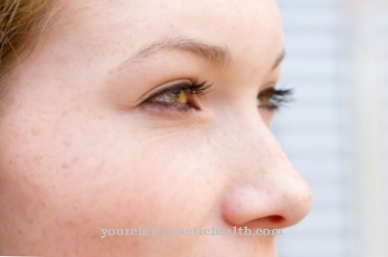Difficulty concentrating or Poor concentration are terms for an impairment of concentration, which can be expressed differently. Concentration disorders or poor concentration can only occur briefly or over a long period of time.
What are concentration disorders?

One speaks of a concentration disorder or poor concentration when the concentration of a person appears unusually different than in the normal state.
Here the concentration itself is the attention to a certain action or sensory stimulus. Concentration can also be directed to other people or objects. Concentration allows you to focus on things more precisely, while the surroundings are perceived only marginally or blurred. Concentration is based on a mental effort, which therefore does not last forever. Primary school children, for example, can only concentrate for a quarter of an hour. In adults, the concentration decreases after an hour at the latest. Fluctuations can of course occur individually.
If the concentration decreases in this normal cycle, one cannot speak of a concentration disorder or poor concentration. A concentration disorder can occur at any age. Often, however, this symptom is wrongly attributed to children, because they have not yet developed the same ability to concentrate as adults.
However, if the general ability to concentrate deviates from the normal values, there is often a concentration disorder or poor concentration behind it.The difference between a concentration disorder and a concentration disorder is that a concentration disorder only lasts for a short time, while a concentration disorder lasts for a longer period of time.
It is not medically established exactly when a concentration disorder occurs. Nevertheless, concentration disorders can occur in various dimensions and are also subject to a wide variety of causes.
causes
Short-term concentration disorders or poor concentration usually have no pathological causes. This is mainly caused by stress, burnout, excessive demands, lack of sleep, too much coffee, drugs, smoking and alcohol. However, a lack of exercise, poor nutrition, mineral and vitamin deficiencies, side effects of medication and allergies can also cause temporary or poor concentration. Long-term computer games or watching TV, coupled with a lack of sleep, are the main causes of concentration disorders, especially in children and adolescents, which are then also noticeable in school grades.
Concentration disorders or poor concentration can also be related to physical complaints or illnesses. In particular, psychosomatic and neurological problems are common causes. Other diseases that show poor concentration as a symptom are hypothyroidism, depression, menopause and anorexia. In older patients, poor cerebral circulation and Alzheimer's disease are also possible. Concentration disorders in women during menopause are rather harmless.
In rare cases, genetic causes or early childhood damage or complications are also reasons for concentration disorders. In this context, dyslexia known as poor concentration or attention deficit hyperactivity disorder (ADHD) is often on everyone's lips.
You can find your medication here
➔ Medicines against concentration disordersDiseases with this symptom
- Hypothyroidism
- hay fever
- dementia
- Alzheimer
- Burnout syndrome
- Male cat
- Creutzfeldt-Jakob disease
- Sleep apnea
- ADHD
- Mineral deficiency
- Kidney weakness
- Low blood pressure
- Nicotine addiction
- Affective disorders
- Malnutrition
Complications
Difficulty concentrating often results in social complications. Those affected often find it difficult to watch the news, read the newspaper, or follow a conversation. A permanent lack of concentration can therefore have far-reaching consequences for everyday life. Outsiders may interpret the lack of concentration as a lack of interest.
If, for example, a person repeatedly loses the thread in a personal conversation or is unable to answer questions or comments in the same way. This (wrong) impression can also become a problem at work. Overall, performance problems often suffer from poor concentration. Supervisors and colleagues, but also teachers and trainers, may interpret the lack of concentration as laziness or stupidity.
Bad grades, failed exams, or disciplinary action are possible consequences. Particularly severe concentration disorders, such as those that can occur with depression, may lead to temporary incapacity for work. In traffic, when using machines and in other critical situations, poor concentration may increase the risk of accidents.
If the concentration disorders are accompanied by memory problems, they can also affect the use of medication: For example, there is a risk that people will forget to take medication or take it twice. This fact can make treatment difficult and cause further problems. In addition, other complications are possible, depending on the cause of the concentration disorders.
When should you go to the doctor?
Concentration disorders should always be examined and treated by a doctor, as these can severely affect the patient's life. In children in particular, early treatment of the concentration disorders is important so that they do not affect adulthood. Children should then be examined by a doctor if the concentration disorders are having a negative impact on school grades and social contacts. This can lead to deterioration or social exclusion.
Adults with concentration disorders should also seek treatment, as these can have a very negative effect on everyday life. If the disorder occurs suddenly or is connected to a special event, a visit to a doctor is necessary. If the concentration disorders only occur for a short time and go away on their own, no doctor needs to be consulted. As a rule, the family doctor can be visited first, who will refer the patient to an appropriate specialist.
Doctors & therapists in your area
Treatment & Therapy
First of all, the focus is always on talking to the treating doctor. Special attention is paid to the living conditions of the child or adult. In many cases, discussions should therefore also be held with parents and teachers.
In order to diagnose a concentration disorder or lack of concentration, the doctor or psychologist then uses test procedures. The test series to test the ability to concentrate (TPK) or KT 3-4 is mostly used in children. Here, the patients are given certain tasks to test their ability to concentrate. Especially with regard to distractibility, these specific tests can give good results.
If the doctor or psychologist then finds the correct cause, appropriate further examinations are initiated as the case may be. Above all, organic or psychosomatic diseases should be excluded. In order to be able to rule this out, eye tests and hearing tests are carried out. The hormone concentration in the blood is also measured.
Then the treatment is carried out according to the final cause. Autogenic training and other relaxation techniques (progressive muscle relaxation, yoga, acupuncture) can help to increase the ability to concentrate again in the event of stress and burnout. Your doctor or psychologist will usually recommend concentration exercises. Mostly these are logic games or puzzles, but they are not for everyone. Therefore, concentration-specific sports such as surfing and basketball are well suited to not only increase the ability to concentrate, but also to improve general well-being at the same time. Jogging and swimming can also empty the mind of unnecessary ballast and thus sharpen concentration in problematic situations.
If the concentration disorder or lack of concentration is based on an organic or disease-related cause, this must first be treated primarily. Even for children and adolescents with ADHD, there are suitable treatment options that their doctor will suggest.
Outlook & forecast
The prognosis for concentration disorders depends mainly on the causes. A concentration disorder caused by an iron deficiency or some other nutritional deficiency can usually be treated well. Symptoms usually go away once the deficiency is resolved.
However, some deficiency symptoms can lead to permanent (irreversible) damage. This is possible, for example, with a severe deficiency in vitamin B12. In this case, however, treatment (for example by taking dietary supplements) can help prevent the damage that has occurred. Vitamin B12 deficiency in infancy has an impact on the child's development and can slow it down or impair it permanently. In such a case, the concentration disorders usually persist.
Concentration disorders caused by ADD or ADHD are often treated with medication. The prospect of improving symptoms is often good here. However, it is not always possible to fully control the difficulty concentrating. ADD and ADHD occur particularly strongly in childhood and typically weaken in late adolescence and adulthood. However, the mental illness persists in some adults in full.
In the case of other mental disorders that are associated with concentration disorders, the prognosis also depends on the causative illness. In schizophrenia and (major) depression, the symptom often occurs in phases with appropriate treatment.
You can find your medication here
➔ Medicines against concentration disordersprevention
Concentration disorders or poor concentration are above all a product of our western way of life. Stress, hectic pace and work pressure are mostly the responsible indicators. Therefore, relaxation techniques in particular should be learned and used regularly in the prevention of concentration disorders. As already mentioned, these include autogenic training, progressive muscle relaxation, yoga and acupuncture. You should also do a lot of sport.
Team sports and endurance sports in particular create a free spirit and increase the ability to concentrate. Finally, it is advisable to eat healthily. Low-fat and sugar-free food is a matter of course, accompanied by fruit and vegetables rich in vitamins. Avoid excessive coffee and completely avoid alcohol and nicotine.
You can do that yourself
Attention deficit disorder is often the reason for poor concentration in children. This belongs in specialist medical treatment. Difficulty concentrating in adults manifests itself with various side effects and can also be influenced by exercise and a healthy lifestyle. Getting enough sleep and a balanced diet can improve your ability to concentrate. Those who drink a lot stimulate blood circulation in the brain and can therefore also increase their concentration.
In many cases, a new coping strategy for stressful situations makes sense. For example, it helps to direct one's attention to a neutral topic and to tell oneself that the situation can be dealt with. If you have to work very concentrated, you should always take breaks. The less media are consumed, the better for the mental performance. Caffeine, alcohol or nicotine also have a negative effect on the ability to concentrate. People with poor concentration should avoid sedatives and stimulants alike. A half-hour walk before bed or reading a pleasant book is much more useful. Neck tension can also lead to concentration problems.
If a situation appears particularly threatening, it is important to get out of the situation. Drinking a cup of tea or water in peace will help overcome anxiety. Getting the annoying thoughts down on paper is another proven strategy. An anxiety disorder could also be behind a lack of concentration. This must be treated psychotherapeutically.



.jpg)




















.jpg)



